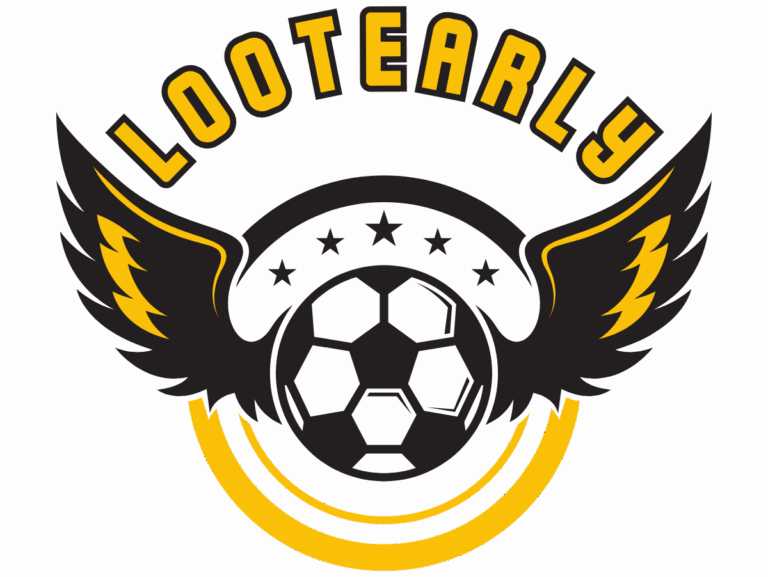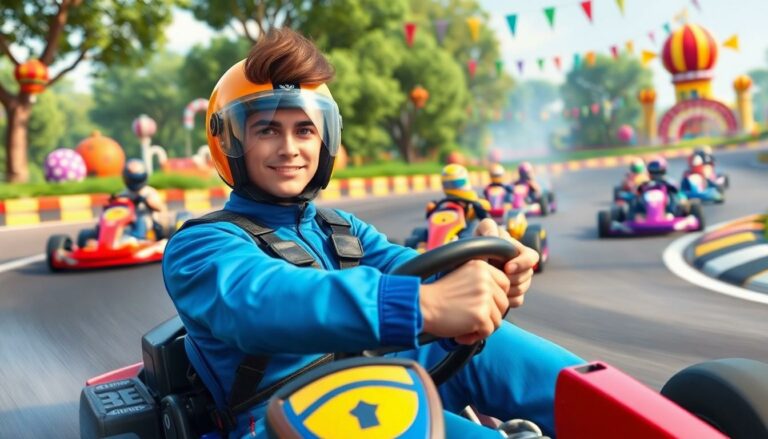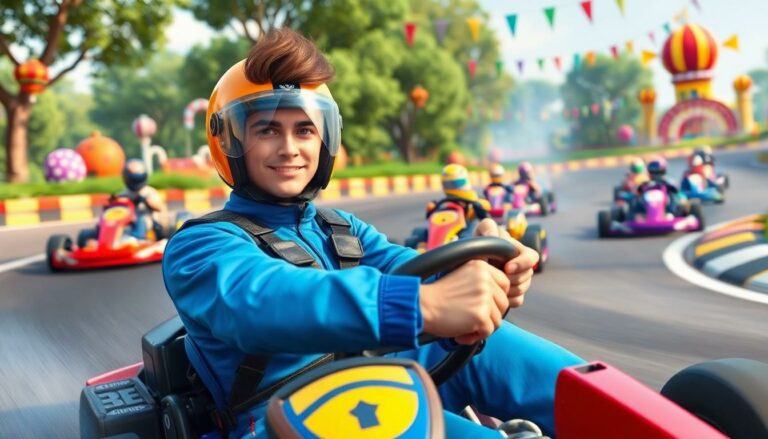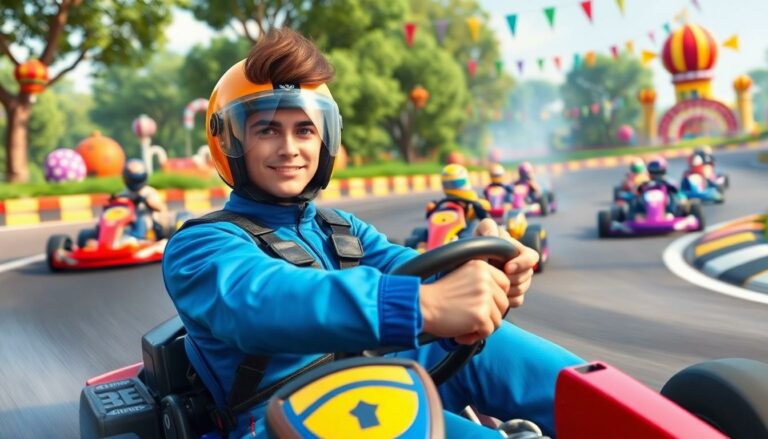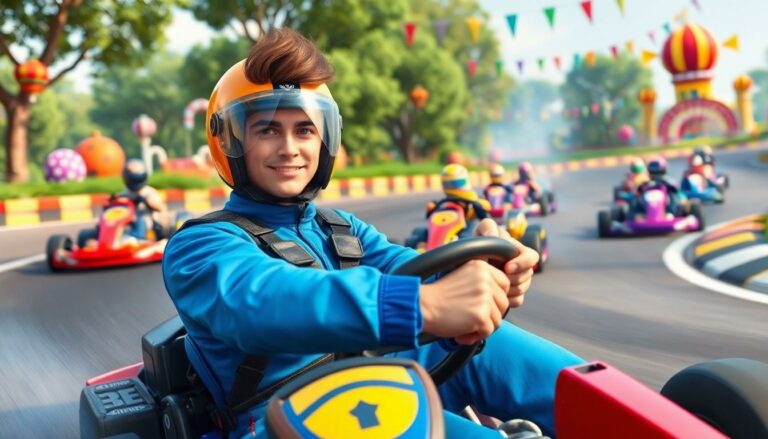Imagine a world where math isn’t just about numbers and equations but also about high-speed thrills and competitive fun. Enter math playground racing games, where kids can rev their engines while sharpening their math skills. Who said learning can’t be exhilarating? These games transform tricky equations into exciting challenges, making math feel less like a chore and more like a joyride.
Table of Contents
ToggleOverview of Math Playground Racing Games
Math playground racing games blend the thrill of racing with essential math skills. These games cater to children, providing them with an interactive platform to apply their math knowledge. Engaging graphics and exciting gameplay draw players in, enhancing focus and retention.
Players practice various math concepts while racing against competitors or the clock. Addition, subtraction, multiplication, and division are often central to gameplay. Each challenge presents opportunities to complete calculations quickly, reinforcing problem-solving abilities.
Levels typically scale in difficulty, ensuring appropriate challenges for different skill levels. As players advance, they encounter new math problems, leading to continued learning. Game mechanics reward quick thinking and accuracy, motivating players to improve their skills.
Additionally, the competitive aspect of racing adds excitement. Players can track their progress through leaderboards, fostering a sense of accomplishment. Friends can compete against one another, encouraging teamwork and friendly rivalries.
Parents and educators appreciate the educational value these games offer. By promoting both math skills and competitive spirit, they create a well-rounded learning experience. Overall, math playground racing games transform traditional learning into an exhilarating adventure, making math enjoyable and effective.
Benefits of Playing Racing Games
Math playground racing games offer multiple benefits that significantly enhance the learning experience. These games engage kids in an entertaining way while teaching essential math concepts.
Enhancing Mathematical Skills
Racing games effectively reinforce mathematical skills. Players tackle problems related to addition, subtraction, multiplication, and division during gameplay. Engaging graphics and interactive formats motivate children to solve math problems quickly. Each racing level adjusts in difficulty, catering to varying skill levels and promoting progressive learning. Reinforcement through practice leads to improved confidence in math abilities. Tracking progress on leaderboards gives players a clear sense of achievement. Overall, blending fun with learning creates a unique platform for mastering math skills.
Encouraging Critical Thinking
Critical thinking becomes an integral part of the racing experience. Players must make strategic decisions, such as choosing the best path or tactics to outsmart competitors. Each race requires quick mental calculations to optimize performance. Solving math challenges under pressure stimulates cognitive flexibility. Engaging in friendly competition enhances analytical thinking as players adapt their strategies. Racing games foster a problem-solving mindset that can be applied across various subjects. This development of critical thinking skills builds a foundation for future academic success.
Popular Math Playground Racing Games
Math playground racing games engage kids while honing their math skills. Two popular examples stand out with unique features that enhance the learning experience.
Game 1: Description and Features
Math Racer combines racing excitement with math challenges. Players race against the clock while solving problems across addition, subtraction, multiplication, and division. Engaging graphics capture attention, ensuring players remain focused. Different levels adjust to skill sets, allowing gradual learning. A leaderboard tracks progress, creating motivation and healthy competition among friends. Its design encourages quick thinking and efficient problem-solving under time restraints. Overall, Math Racer effectively merges fun with educational value.
Game 2: Description and Features
Race to Math City offers vibrant visuals while focusing on essential math skills. Players navigate a colorful racetrack filled with math puzzles to solve. Each successful answer powers their vehicle, promoting quick calculations and logical reasoning. Levels increase in difficulty, ensuring continued engagement as skills improve. This game not only boosts confidence but also develops critical thinking skills essential for academic success. Friends can compete on various tracks, making learning both social and dynamic. Race to Math City illustrates the thrill of racing while reinforcing math fundamentals.
How to Integrate Racing Games into Learning
Integrating racing games into learning environments enhances student engagement and retention of math skills. Teachers can introduce these games as part of the curriculum, allowing students to practice math concepts in a dynamic setting. Utilizing multiplayer options fosters collaboration among peers, encouraging teamwork while competing in solving math challenges.
Setting clear educational goals helps to direct gameplay. Educators can specify which math topics, such as multiplication or fractions, to focus on during the racing experience. Incorporating math racing games into lesson plans motivates students to participate actively and enjoy their learning process.
Scheduling regular game sessions promotes consistency and reinforces concepts being taught in class. Establishing a leaderboard can motivate students to improve their performance while promoting a sense of friendly competition.
Parents can support this integration by incorporating racing games into home study routines. Designating specific times for gameplay can enhance practice while reinforcing math skills outside of school hours. Tracking improvement through game metrics allows both educators and parents to monitor progress effectively.
Implementing feedback mechanisms is crucial for continuous improvement. After each session, discussing game challenges encourages students to reflect on their problem-solving strategies. This discussion deepens understanding and enhances retention of math concepts learned during gameplay.
Creating a balance between game time and traditional learning methods ensures a well-rounded educational experience. Integrating racing games nurtures an enjoyable learning atmosphere while developing essential math skills necessary for future academic success.
Conclusion
Math playground racing games offer a unique way for kids to develop essential math skills while having fun. By blending competitive racing with engaging math challenges, these games create an enjoyable learning environment that keeps players motivated. The interactive nature of these games not only helps children grasp mathematical concepts but also fosters critical thinking and problem-solving abilities.
As educators and parents seek innovative methods to enhance learning experiences, incorporating racing games into the curriculum proves to be an effective strategy. With the right balance of gameplay and traditional methods, children can build a strong foundation in math that will benefit them academically and beyond. Embracing these games can transform math from a daunting subject into an exciting adventure.
